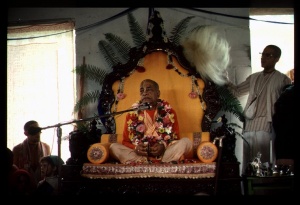CC Madhya 25.54 (1975): Difference between revisions
(Vanibot #0027: CCMirror - Mirror CC's 1996 edition to form a basis for 1975) |
(Vanibot #0020: VersionCompareLinker - added a link to the Version Compare feature) |
||
| Line 2: | Line 2: | ||
<div style="float:left">'''[[Sri Caitanya-caritamrta (1975)|Śrī Caitanya-caritāmṛta (1975)]] - [[CC Madhya (1975)|Madhya-līlā]] - [[CC Madhya 25 (1975)|Chapter 25: How All the Residents of Vārāṇasī Became Vaiṣṇavas]]'''</div> | <div style="float:left">'''[[Sri Caitanya-caritamrta (1975)|Śrī Caitanya-caritāmṛta (1975)]] - [[CC Madhya (1975)|Madhya-līlā]] - [[CC Madhya 25 (1975)|Chapter 25: How All the Residents of Vārāṇasī Became Vaiṣṇavas]]'''</div> | ||
<div style="float:right">[[File:Go-previous.png|link=CC Madhya 25.53 (1975)|Madhya-līlā 25.53]] '''[[CC Madhya 25.53 (1975)|Madhya-līlā 25.53]] - [[CC Madhya 25.55 (1975)|Madhya-līlā 25.55]]''' [[File:Go-next.png|link=CC Madhya 25.55 (1975)|Madhya-līlā 25.55]]</div> | <div style="float:right">[[File:Go-previous.png|link=CC Madhya 25.53 (1975)|Madhya-līlā 25.53]] '''[[CC Madhya 25.53 (1975)|Madhya-līlā 25.53]] - [[CC Madhya 25.55 (1975)|Madhya-līlā 25.55]]''' [[File:Go-next.png|link=CC Madhya 25.55 (1975)|Madhya-līlā 25.55]]</div> | ||
{{CompareVersions|CC|Madhya 25.54|CC 1975|CC 1996}} | |||
{{RandomImage}} | {{RandomImage}} | ||
==== TEXT 54 ==== | ==== TEXT 54 ==== | ||
<div class="verse"> | <div class="verse"> | ||
: | :'vedānta'-mate,-brahma 'sākāra' nirūpaṇa | ||
: | :'nirguṇa' vyatireke tiṅho haya ta' 'saguṇa' | ||
</div> | </div> | ||
| Line 18: | Line 17: | ||
<div class="synonyms"> | <div class="synonyms"> | ||
vedānta-mate—according to Vedānta philosophy; brahma—the Absolute Truth; sa-ākāra nirūpaṇa—established as the Supreme Personality of Godhead, a person; nirguṇa—without material qualifications; vyatireke—by indirect explanations; tiṅho—the Supreme Personality of Godhead; haya—is; | vedānta-mate—according to Vedānta philosophy; brahma—the Absolute Truth; sa-ākāra nirūpaṇa—established as the Supreme Personality of Godhead, a person; nirguṇa—without material qualifications; vyatireke—by indirect explanations; tiṅho—the Supreme Personality of Godhead; haya—is; ta'-indeed; sa-guṇa—fully qualified with spiritual attributes. | ||
</div> | </div> | ||
| Line 25: | Line 24: | ||
<div class="translation"> | <div class="translation"> | ||
"According to Vedānta philosophy, the Absolute Truth is a person. When the word nirguṇa [without qualities] is used, it is to be understood that the Lord has attributes that are totally spiritual. | |||
</div> | </div> | ||
Latest revision as of 16:39, 27 January 2020
Śrī Caitanya-caritāmṛta (1975) - Madhya-līlā - Chapter 25: How All the Residents of Vārāṇasī Became Vaiṣṇavas

His Divine Grace
A.C. Bhaktivedanta Swami Prabhupada
A.C. Bhaktivedanta Swami Prabhupada
TEXT 54
- 'vedānta'-mate,-brahma 'sākāra' nirūpaṇa
- 'nirguṇa' vyatireke tiṅho haya ta' 'saguṇa'
SYNONYMS
vedānta-mate—according to Vedānta philosophy; brahma—the Absolute Truth; sa-ākāra nirūpaṇa—established as the Supreme Personality of Godhead, a person; nirguṇa—without material qualifications; vyatireke—by indirect explanations; tiṅho—the Supreme Personality of Godhead; haya—is; ta'-indeed; sa-guṇa—fully qualified with spiritual attributes.
TRANSLATION
"According to Vedānta philosophy, the Absolute Truth is a person. When the word nirguṇa [without qualities] is used, it is to be understood that the Lord has attributes that are totally spiritual.